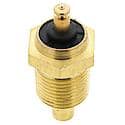1976 Chevrolet Monza Coolant Temperature Sensors
Enhance and Protect Your 1976 Chevrolet Monza with Quality Coolant Temperature Sensors
Maintaining the performance of your 1976 Chevrolet Monza starts with choosing the right parts, and a high-quality Coolant Temperature Sensors helps ensure a reliable and efficient vehicle. At Advance Auto Parts, we offer Coolant Temperature Sensors specifically for the 1976 Chevrolet Monza, ensuring a perfect fit and lasting durability. Choosing to shop with Advance Auto Parts means you’re making a smart decision to prioritize both quality and reliability for your vehicle.
Affordable and Reliable Coolant Temperature Sensors for Every Budget
Finding a Coolant Temperature Sensors that combines quality with affordability is easy at Advance Auto Parts. With prices starting as low as $15.99 and an average price of $18.43, you can choose one that fits your budget while delivering the quality you expect. Our Coolant Temperature Sensors are competitively priced, ranging from $15.99 to $22.79, so you get value without compromising on strength or reliability.
Trusted Brands and Top-Rated Options
With 3 Coolant Temperature Sensors from 1 trusted brands in stock, Advance Auto Parts has you covered. Popular options include Temperature Sender With Gauges, Engine Coolant Temperature Switches, and Engine Coolant Temperature Switches, starting at $15.99. Our selection includes highly regarded brands such as Carquest Premium, and more, offering you top-notch reliability. For example, we have 3 Carquest Premium Coolant Temperature Sensors starting at $15.99 with an average rating of 4 stars.
Explore Related Parts for a Complete Solution
To further enhance your 1976 Chevrolet Monza, don’t miss our related parts categories, including Water Pump Housing Gaskets and Water Pumps. These additions will round out your repair or upgrade project and ensure your vehicle is ready for any adventure.
FAQs for 1976 Chevrolet Monza Coolant Temperature Sensors
Which Coolant Temperature Sensors are the top sellers for the 1976 Chevrolet Monza?
Out of 3 Coolant Temperature Sensors that fit 1976 Chevrolet Monzas, the following parts are the top sellers:






How can I make sure that a part will be compatible with my 1976 Chevrolet Monza?
Our Chevrolet Monza aftermarket and OEM parts are designed specifically for the 1976 model. You can always find your specific fitment and compatibility for your 1976 Chevrolet on an individual product page.
What is the price range for 1976 Chevrolet Monza Coolant Temperature Sensors?
The range of prices of Coolant Temperature Sensors for the 1976 Chevrolet Monza goes from $15.99 up to $22.79 for the most premium parts.
What is the average price of 1976 Chevrolet Monza Coolant Temperature Sensors?
1976 Chevrolet Monza Coolant Temperature Sensors average $18.43 for our selection of OEM and aftermarket parts. Keep in mind the variety of brands we offer, such as Carquest Premium, and more, so you are likely to find a wide range of prices across a variety of brands and products.
Does Advance Auto Parts sell Coolant Temperature Sensors for other Chevrolet Monza model years?
Can I get help with 1976 Chevrolet Monza Coolant Temperature Sensors orders?
Contact our customer support team, by chat or phone, through the help desk page, where you can find instant answers about Chevrolet Coolant Temperature Sensors and more.
What is your return policy for Chevrolet Monza Coolant Temperature Sensors?
Advance Auto Parts keeps returns simple. For new Chevrolet Monza Coolant Temperature Sensors and accessories, your online orders can be returned, in their original condition, within 45 days. For requirements, see the returns page.
Coolant Temperature Sensors For Other Chevrolet Monza Model Years
Looking for parts for a different model year of the Chevrolet Monza? Below, you’ll find links to Coolant Temperature Sensors for a range of model years, from 1975 models all the way up to 1980. At Advance Auto Parts, we carry high-quality OEM and aftermarket auto parts for popular years like 1975, 1977, 1978, 1979, 1980, and more, ensuring you have access to the best options for your specific needs. Choosing a Coolant Temperature Sensors from Advance Auto Parts means investing in top-tier parts that will keep your Chevrolet Monza running at its best, no matter the year.
